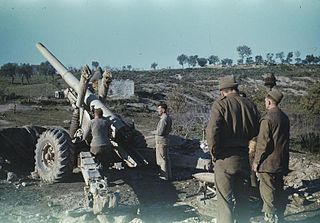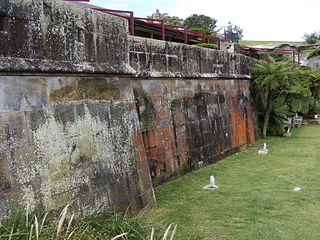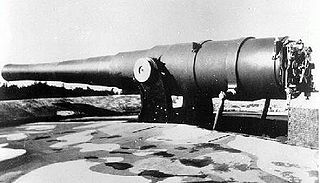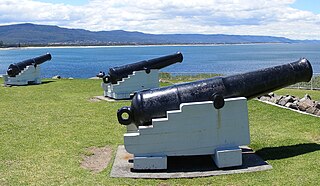
La Perouse is a suburb in south-eastern Sydney, in the state of New South Wales, Australia. The suburb of La Perouse is located about 14 kilometres (8.7 mi) southeast of the Sydney central business district, in the City of Randwick.

The BL 5.5-inch gun was a British artillery gun introduced during the middle of the Second World War to equip medium batteries.

Bare Island is a heritage-listed islet located in south-eastern Sydney, in La Perouse in the City of Randwick local government area in the state of New South Wales, in eastern Australia. The islet is located about 16 kilometres (9.9 mi) south east of the Sydney central business district, within Botany Bay, close to the bay's northern headland. Containing former fortification facilities, Bare Island was a former war veterans' home and museum and is now a historic site that was added to the New South Wales State Heritage Register on 2 April 1999 and is significant as an almost completely intact example of late nineteenth century coastal defence technology. It was designed by Sir Peter Scratchley, Gustave Morell and James Barnet and built from 1881 to 1889 by John McLeod on behalf of the NSW Department of Public Works.

The BL 6-inch gun Mark VII was a British naval gun dating from 1899, which was mounted on a heavy travelling carriage in 1915 for British Army service to become one of the main heavy field guns in the First World War, and also served as one of the main coast defence guns throughout the British Empire until the 1950s.

The Georges Head Battery, also called the Georges Head Military Fortifications, is a heritage-listed former military fortification located on the Georges Head on Chowder Bay Road, Georges Heights, in the suburb of Mosman, in the Mosman Council local government area of New South Wales, Australia.

Fort Scratchley, a former coastal defence installation, is now a museum. It is located in Newcastle East, a suburb of Newcastle, New South Wales in Australia. It was built in 1882 to defend the city against a possible Russian attack. However, its guns were not fired in anger until 8 June 1942, during the shelling of Newcastle. The Australian Army left the site in 1972.

The Ben Buckler Gun Battery is a heritage-listed fortified former gun emplacement and military installation of the late-Victorian period and now public open space located in the North Bondi locality of Ben Buckler, in the Waverley Municipality of Sydney, New South Wales, Australia. The gun battery was designed by NSW Colonial Government and built during 1893. It is also known as Ben Buckler Gun Battery 1893, 9.2 Disappearing Gun and Bondi Battery. The property is owned by Waverley Municipal Council. It was added to the New South Wales State Heritage Register on 15 December 2006.

The Steele Point Battery is a small fort, on the shores of Sydney Harbour in the eastern Sydney suburb of Vaucluse, New South Wales, Australia.

Fort Banks is an old World War II bunker and fortification complex that was used to protect the approaches to Botany Bay. The fortification is located north of Cape Banks in La Perouse, New South Wales, Australia.

Flagstaff Hill Fort is a former military fort at Flagstaff Point, Wollongong, New South Wales, Australia.
Illowra Battery is a former Australian Army coastal-artillery battery located at Hill 60, Port Kembla, New South Wales in Australia, built and in service during World War II. It was also otherwise known as Hill 60 Battery.

The following is a List of Coastal Batteries in Australia and Territories during World War II. The main threat came early in the war from German raiders and threat of Japanese raids or invasion, and hence all available ordnance was pressed into service, including some obsolete guns and field guns adapted for coast defence.

The BL 9.2-inch Mk I–VII guns were a family of early British heavy breechloading naval and coast defence guns in service from 1881 to the end of World War I. They were originally designed to use the old gunpowder propellants.

The BL 6 inch gun Mk V was an early Elswick Ordnance Company breech-loading naval gun originally designed to use the old gunpowder propellants. They were used for coast defence around the British Empire.

Fort Nepean is a former defensive facility occupying part of Point Nepean, Victoria, Australia. It was part of a network of fortifications, commanded from Fort Queenscliff, protecting the narrow entrance to Port Phillip. It is now part of Point Nepean National Park and a local tourist attraction.

The Signal Hill Battery was constructed in 1892–3 at Watsons Bay and is adjacent to the Signal Hill Lighthouse on Old South Head Road.

Culver Battery is a former coastal artillery battery on Culver Down, on the eastern side of the Isle of Wight, England. The fortification is one of several Palmerston Forts built on the island following concerns about the size and strength of the French Navy in the late 19th century. It was operational during the First and Second World Wars. The battery was closed in 1956.

Fort Ballance is a former coastal artillery battery on Point Gordon on Wellington's Miramar Peninsula.

St Anthony Battery is a former 19th century gun battery at St Anthony Head, Roseland Peninsula, Cornwall, England. It was built in 1895-97 and served during both World Wars. Following its decommissioning in 1956, the battery was acquired by the National Trust.





















